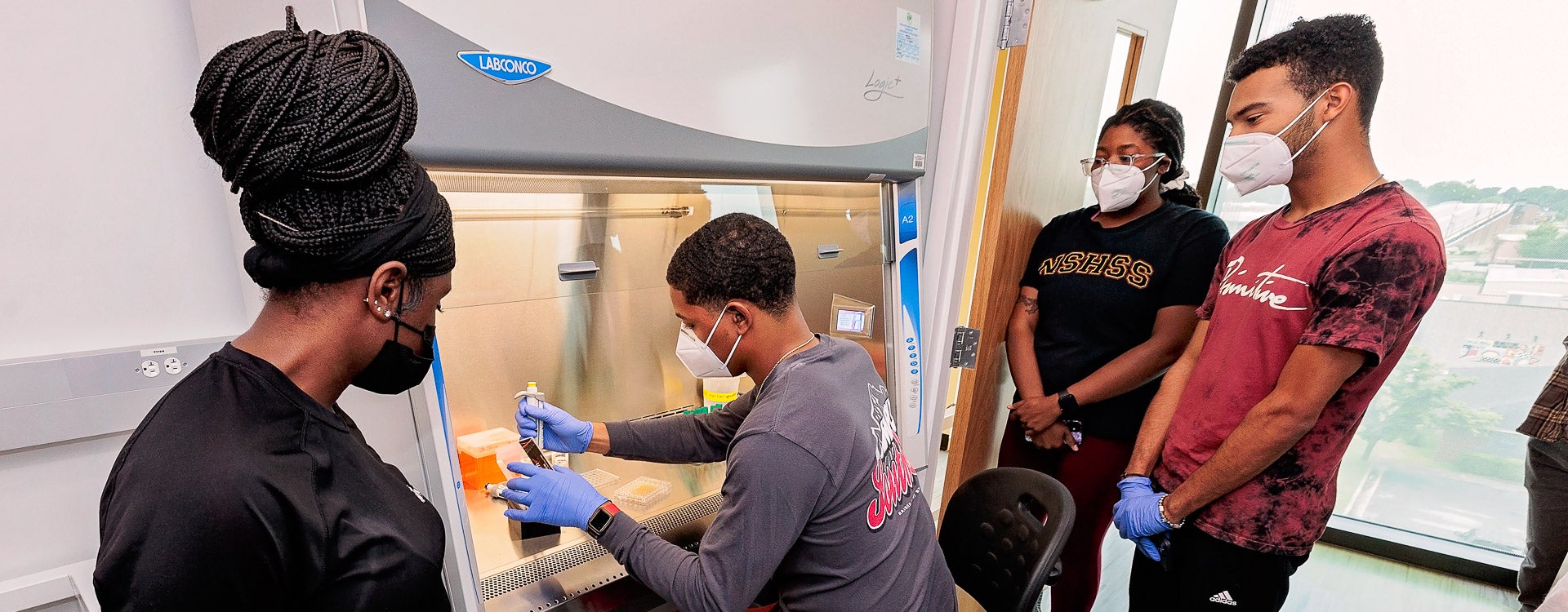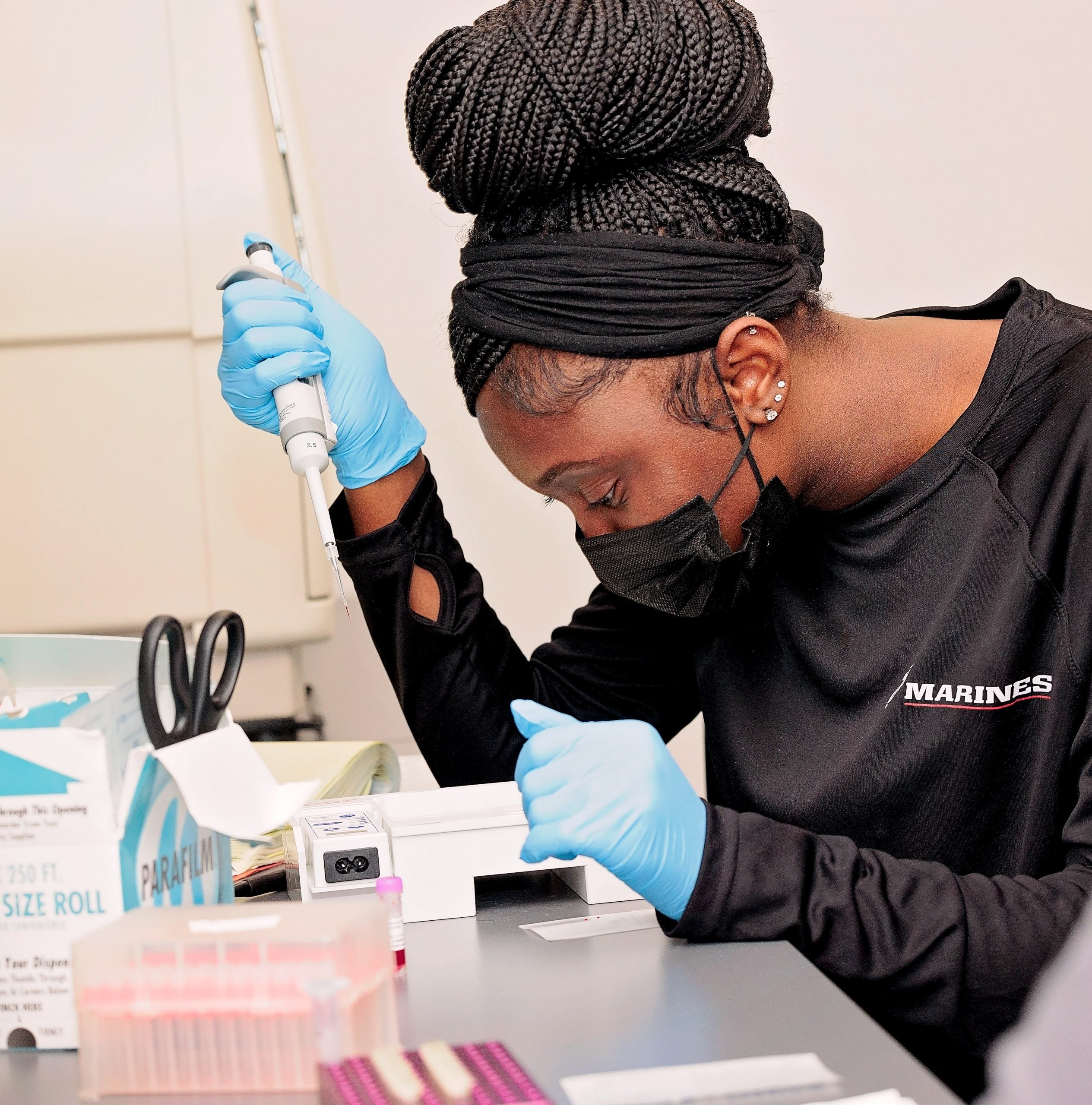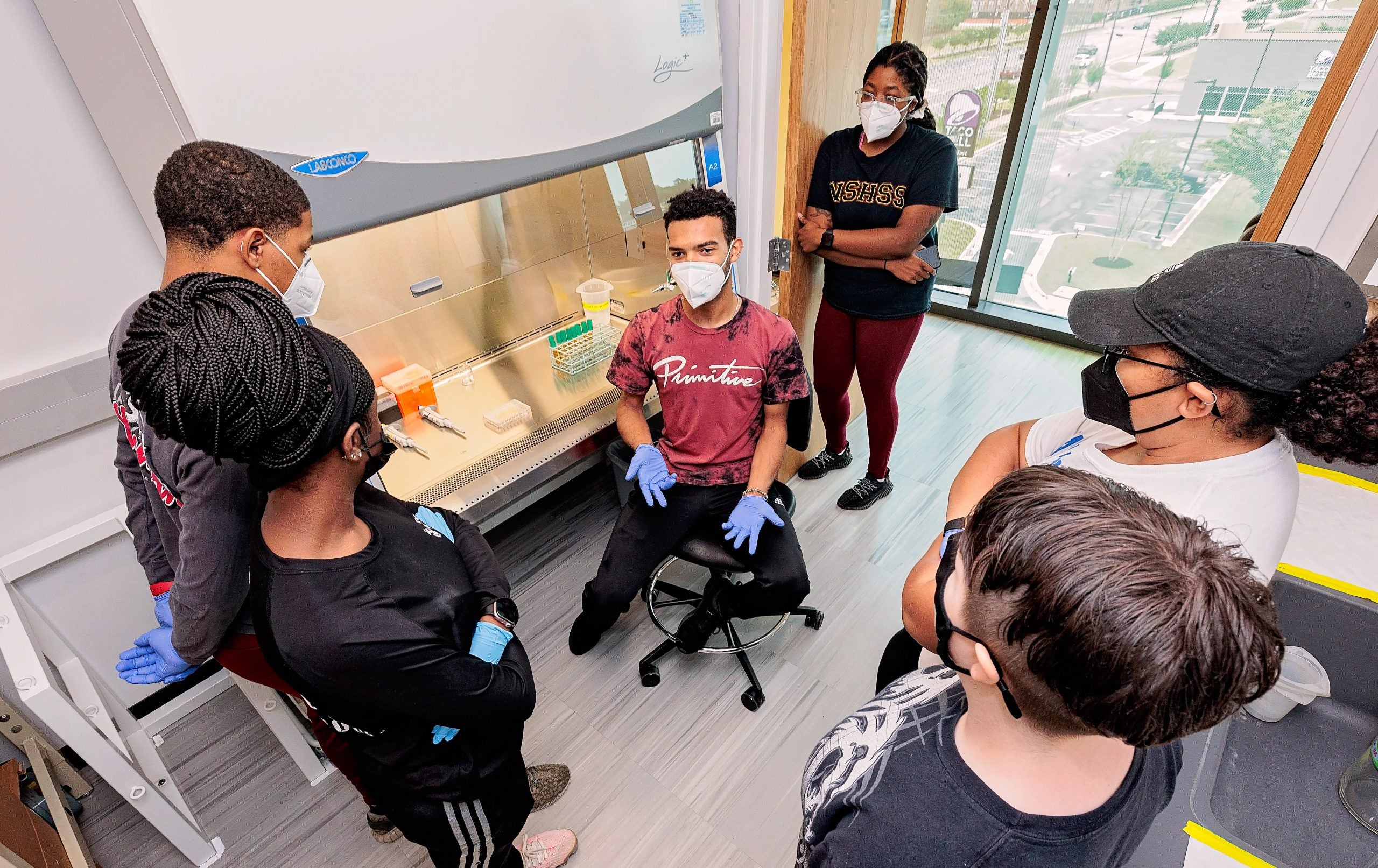Grant for ECU-FSU partnership to support minority public health graduate students
An East Carolina University and Fayetteville State University partnership has secured more than $1.3 million in grant funding from the North Carolina GlaxoSmithKline Foundation to address regional public health needs.
The partnership will build pathways to recruit a diverse graduate student population through the development of a summer research immersion program and provide graduate student scholarship support. The partnership will fund scholarships for students from the state’s Minority Serving Institutions — Historically Black Colleges and Universities and The University of North Carolina at Pembroke — to enter East Carolina University’s public health, environmental health, health education and promotion, biology and biotechnology graduate programs.
Eastern North Carolina is a predominantly rural region, characterized by high rates of preventable chronic health conditions, such as diabetes, heart disease and obesity. The COVID-19 pandemic exacerbated this situation and exposed the ongoing need for a strong public health infrastructure.
“It is exciting to see this program supporting diversity and providing opportunities to underserved students centered on public health graduate educational attainment, and the future impact of those educated through our commitment to this program shows promise to impact the health of the eastern NC residents for years to come” said Marilyn Foote-Hudson, executive director of the NC GlaxoSmithKline Foundation.
Applicants for the program must be from Minority Serving Institutions; a rising sophomore, junior or senior; in good standing with their college or university (with at least a 3.0 GPA); and from an underrepresented social group or first-generation student.
“This is a huge investment by the North Carolina GlaxoSmithKline Foundation into the long-term health of eastern North Carolina,” said Dr. Keith Keene, a biology professor and director of the Center for Health Disparities at ECU’s Brody School of Medicine, who serves as one of the program’s directors. “This generous funding will support a summer research immersion pathway program at ECU for undergraduates from minority-serving institutions, provide graduate student scholarship support, and match graduate students with community- and field-based engaged learning opportunities in underserved communities. This is a win-win for everyone, but most importantly it’s a huge investment in the health of underserved communities across rural eastern North Carolina for generations to come.”
Over the past decade, the nation’s public health workforce has decreased by an estimated 17%, further exacerbating eastern NC’s challenges in delivering quality health care to the 41-county region that runs roughly from the I-95 corridor to the coast. ECU and FSU are the two major public universities that lie in the heart of this medically underserved region. As residents of the region, and academic anchors for eastern North Carolina, both institutions’ students and faculty have first-hand exposure to health care disparities and unique positioning to understand and innovate on behalf of the region’s residents.
ECU’s public health, environmental health and health education and promotion programs are the only accredited masters-level programs that promote public wellness in eastern North Carolina.
“It’s really important that we not only strengthen our public health education on behalf of the residents of this region, but that we also develop a public health workforce that is more representative of the population it serves,” Keene said. “This program will be a tremendous benefit to all parties involved — our students, respective universities and the communities we serve.”
While the initial goal is to recruit students from FSU and UNC Pembroke interested in applying to the pipeline program, program directors will expand on the program to include other HBCUs across North Carolina including Elizabeth City State University, NC A&T State University, NC Central University and Winston-Salem State University.
Recruitment and summer internships
The pathways program has two major components — recruitment of eligible students for an intensive summer immersion program at ECU and scholarships that will provide up to two years of full-time graduate education to the students.
“We’ve long shared partnerships with Fayetteville State and other UNC constituent institutions, as well as with the North Carolina GlaxoSmithKline Foundation” said Philip Rogers, East Carolina University chancellor. “It is gratifying that the funding for the program will directly benefit students across the region.”
Darrell Allison, the chancellor of Fayetteville State University, agrees that North Carolina’s future is tied to a strong public health infrastructure.
“Our partnership with ECU aligns with Fayetteville State’s strategic priorities of academic excellence, sustaining the university into the future and providing a real and lasting impact in the communities that our students come from,” Allison said.
Recruitment for the program has already begun. In April 2022, Dr. Danielle Graham, assistant professor of microbiology and interim chair of the Department of Biological and Forensic Sciences at FSU, chaperoned 11 FSU students to ECU to tour the campus, meet with graduate program representatives and take part in an immersive laboratory activity.
Graham, another of the program’s directors, expects that her initial tour will serve as a model for future visits by FSU students to ECU, and ultimately a blueprint for students from other MSIs across North Carolina to follow.
“The visit was rewarding, and the students were really interested in the variety of opportunities that ECU offers for graduate education,” Graham said. “This program offers the support and resources necessary for our students to achieve their career goals while filling an important public health need in their own communities.”
Graham sees the summer immersion program as an opportunity to match students with potential graduate school mentors, build a peer-to-peer community of early career scholars, foster social and professional networks, and prepare them to apply for admission to ECU’s graduate programs.
The summer program will consist of cohorts of 10-12 students living on campus, gaining research experience and professional development opportunities such as building resumes and CVs, enhancing communication and interviewing skills and gaining exposure to career opportunities in research and public health.
“Prospective students will have their summer program completely funded — meals, housing and more — which will allow them to focus on building relationships with graduate school mentors and get real, hands-on experience with meaningful research at ECU,” Graham said.
Scholarships
Each year, 10 eligible students will be admitted into one of ECU’s masters programs (public health, environmental health, health education, biology and molecular biology and biotechnology) and will have their tuition, housing and some incidentals covered by the scholarships provided by the NC GlaxoSmithKline Foundation grant. In addition to covering the costs of the graduate program, ECU will work to place students from the program into mentorship settings with public health workers in eastern North Carolina to give students real-world experience before they graduate.
Complementing the formal programs of study and mentorship collaborations is ECU’s established social safety net of caring for the whole person: the Purple Pantry ensures food security for ECU students; ECU’s Counseling Center provides free, comprehensive behavioral health care; the Student’s Treasure Chest works with students to defray emergency costs; and students have access to quality childcare facilities, on campus and in the community.
“The Foundation’s board made it clear to us that our multi-layered approach to seeing our students through to graduation was a key consideration for awarding the grant,” Rogers said. “Educating our Pirate student body isn’t just about what happens in the classroom or a lab. It is critical that we provide a broad array of student success services. We’ve put a lot of work over the years into establishing systems that keep our students on track to graduation.”
About the North Carolina GlaxoSmithKline Foundation
The North Carolina GlaxoSmithKline Foundation is an independent self-funding 501(c)3 nonprofit organization supporting activities that help meet the educational and health needs of today’s society and future generations. Since its creation in 1986, the foundation has granted over $86.3 million to support North Carolina projects and programs that emphasize the understanding and application of science, health and education at all academic and professional levels. Visit the Foundation at NCGSKFoundation.org.
Photo information
ECU Photos by Cliff Hollis
Caption1: Markis’ Hamilton, an undergraduate student from Fayetteville State University, works in a hood in the ECU Life Sciences and Biotechnology Building.
Caption 2: Fayetteville State University student Alexis Nealy works in a lab in the ECU Life Sciences and Biotechnology Building.
Caption 3: Students from Fayetteville State University visited East Carolina University’s Life Sciences and Biotechnology Building in June 2022 as part of an expanded partnership between the two schools to increase undergraduate enrollments from FSU into ECU graduate programs.
###
East Carolina University News Services
Howard House, 1001 E. Fifth Street
Greenville, NC 27858
ecunews@ecu.edu
Phone: 252-328-6481
news.ecu.edu
Contact
Benjamin Abel, Health Sciences Communications, abelb18@ecu.edu, 252-558-2190


